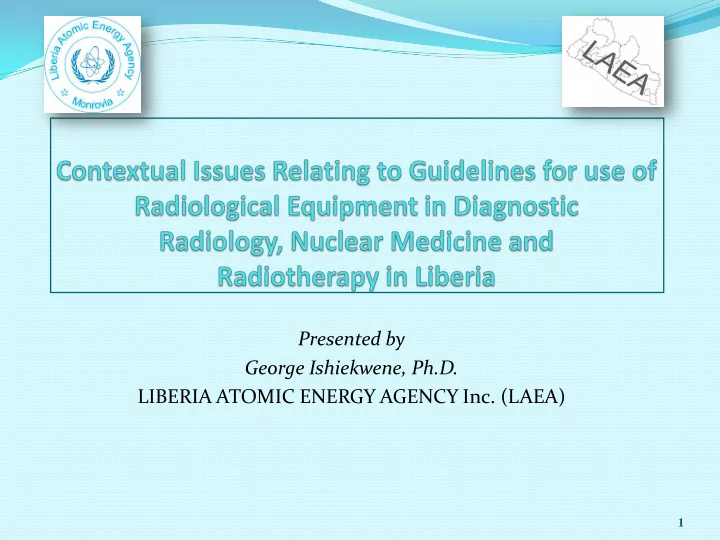

Presented by George Ishiekwene, Ph.D. LIBERIA ATOMIC ENERGY AGENCY Inc. (LAEA) 1
About LAEA A Technical Scientific Support Organization promotes Guidelines and Principles of International Atomic Energy Agency (IAEA) coordinates IAEA technical cooperation activities in Liberia Provides Services in areas of Safety, Security and Safeguards of Radiation 1. Activities and Materials Atomic and Nuclear Energy for peaceful and healthy 2. purposes 2
Some Definitions Electromagnetic Radiation: A light wave in motion Ionizing Radiation High energy radiation: X-rays, Gamma rays Non-ionizing Radiation Relatively low energy radiation : Visible Light, Radio waves 3
Uses of Ionizing Radiation Ionizing radiation sources are widely used in: Medicine Agriculture Industry Research and Education Security checks … 4
Brain Teaser So, imagine if there were no regulations in the transportation industry (land and air) N0 Guidelines, No Policy, No laws, No Regulators Aircrafts Cars Kekehs Motorbikes Leads to increased vulnerability High likely hood of accidents and high impact chaos HIGH RISK!!!! 5
Liberia Situation No Atomic and Nuclear Energy Policy No National Nuclear and Radiation Act No Nuclear and Radiation Regulatory Authority No Law on Radiation Protection No Inventory on Radiation Sources Bottom line: Liberia arguably has “no” regulation in radiation industry Is it reasonable to conclude there may exist high vulnerability and high risks in our radiation industry??????? Or, our case defies logic – no radiation incidents 6
Some Reported Incidents Medical Exposure Workers Dose to the lens of the eyes Public Care givers Patients misadministration of radio-pharmaceuticals miscalibration/miscalculation of dose for radiotherapy bracytherapy sources left in patient overexposure during interventional procedures 7
Reasons for Guidelines Ensure compliance of new equipment with its specification on installation Monitor continuous use of equipment to institute remedial actions if necessary Managing equipment after its lifespan Good practice with respect to equipment handling Satisfactory performance of equipment used Safety measures in the operation of radiation sources Protection of patients and others to medical exposure 8
Stakeholders All of whom have a role in the deployment of equipment for use with patients Health Care Agencies and Professional Bodies 1. 2. Hospitals, Clinics, and Other Institutions 3. Medical Practitioners and Medical Physicists 4. Radiographers and Clinical Technologists 5. Staff and Other Agents 6. Health Service Management Professionals 7. Regulators 9
Proposed Draft Guidelines for the Control of Medical Exposure of Radiation Sources in Liberia Scope and Notification Authorization Inspection, and Enforcement Content Qualitative Criteria Quantitative Criteria 10
Review Process for Guidelines Stakeholders Experts from Relevant Professions, Professional Bodies, Industry, Standards Organizations and International Organizations Process Technical Meetings Validation to Adopt Guidelines 11
12
Recommend
More recommend